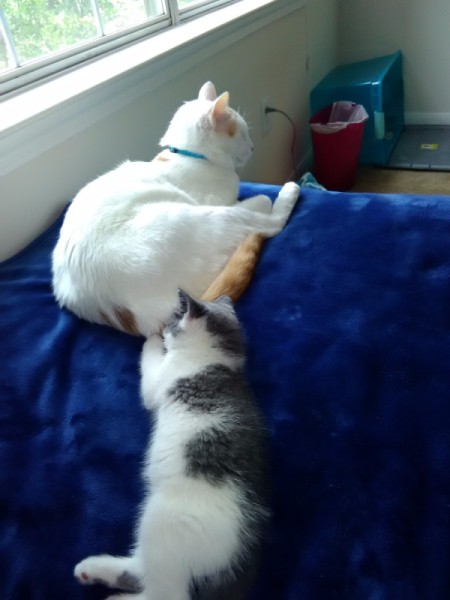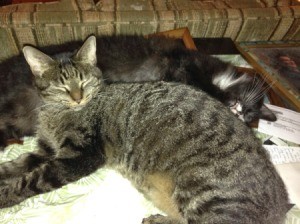 Cats don't willfully misbehave out of spite, anger, or stupidity. Many owners assume their cats are deliberately scratching the furniture or eliminating outside of the box just to be spiteful, but the reality is that those cats are trying their best to come up with a solution on their own.
Cats don't willfully misbehave out of spite, anger, or stupidity. Many owners assume their cats are deliberately scratching the furniture or eliminating outside of the box just to be spiteful, but the reality is that those cats are trying their best to come up with a solution on their own.
Here are the questions asked by community members. Read on to see the answers provided by the ThriftyFun community.
We have a big male cat that has been neutered since he was little, named Roman. Well a few weeks ago I found a kitten in the rain and decided to keep him, he's only at the most five weeks old. I had to bottle feed him at first, but he is eating food and gaining balance haha. (His name is Percy.) 
They both get along just fine, they play, sleep together, and purr and lick on each other. Roman even helped by cleaning Percy's butt every once in awhile to help him go to the bathroom.
But my question is sometimes when I decide to let them both in my room, which originally was Roman's room fyi. Roman starts to meow loudly and almost moan-meow in a way and he will grab Percy by the neck and sometimes carry him, even though he's gotten a little bigger and it's hard for Roman to carry him, but sometimes he just pins Percy down.
Anyways, it only happens every once in awhile, but I watched him do it tonight and it almost looked as though he was mounting him. Even though Percy is way too small. Sometimes it happens when Percy is too hyper and it looks like Roman gets frustrated, maybe it's his way of saying he doesn't want to play?
I'm just curious if this is a problem or is he just claiming Percy like adopting him? Or is it dominance? Sexual aggression?
Anything would be helpful.
Like I said majority of the time they get along, and I don't even know if it's a real problem because besides this, they love each other.
Give Roman some one-on-one time. He is used to being the only one.
Roman seems to be showing the new guy who's boss. Being very territorial, his behavior lines up with typical multi-cat homes. I'm quite certain time will work any issues.
i agree that your little one should see a vet just so you know this is a healthy kitten (sometimes difficult to tell by just watching) and they will need shots.
I have 4 cats: the mother, two females from the first litter of the mother and a male from her second litter. They are all different. The mother has a Main Coon look, Russian Blue for the male, European shorthair for one of the two sisters, and a creamy white fur with light grey tabby stripes look, for the other sister.
They have been spayed and neutered now and they (we?) live together since they were born in the same small flat. Only the mother arrived when she was already 3 month old. They live indoors only and they are all fed on the same food. I am giving you this information because I am looking for the explanation of a total mystery I discovered now that I spend more time with my cats.
The cat involved is the creamy grey one, called Octopus. She is tough, strong, and a real acrobat, not really friendly with her next of kin, but very cool, tender, and friendly with me. She is very talkative with a large range of tones from groans to creepy screams to deal with the daily eternal dilemna of a cat that is - when is dinner? will there be a dinner? why is dinner late? Change the water! This is my chair not yours! And yes, I am going to sit on the keyboard of the computer because it is warm and if you don't let me I am going to stay laying on your two wrists while you will try to type.
It is when loosing this fight, the "what is the true purpose of a computer" fight that I first noticed that even if she is in deep sleep she wakes up with a surprise groan and then a meow when I am about to sneeze. This is the important point she awakes before I sneeze, not even with the one or two short inhalations before the actual sneeze, but really when my nose just starts tickling. So my question is, why does she react to sneezing, in fact to pre-sneezing and most of all, how can she feel, while she is fast asleep, that I am about to sneeze?
I know she is not the only cat to do this, but so far I only read about cats reacting to the actual sound of sneezing, when my cat reacts even before I sneeze. Some people say that it could be because the sound reminds the cat of the hissing of a snake or of another agressive cat, but that doesn't work for mine because she reacts to sneezing even when she is safely at the other end of the flat on the top of a cupboard and she doesn't sound afraid at all. It is just a sort of, "What did you say?" or "Everything's all right?" meow. Another aspect of the mystery is that she is the only one of the 4 cats to do so. Can the ThriftyFun cat lovers community help me find out the why and how of the sneezing mystery?
This is an amazing story! It's almsot as if the cat is psychic ha ha
I know that i'm at the point of knowing when my husband is about to sneeze because even though he doesn't make a sound, he tilts his head back in a special way and he stops breathing. Somehow I can always tell, and say 'bless you' long before the sneeze occurs.
Could your cat be picking up on nonverbal clues like that?
or maybe she IS psychic and you should train her to tell you the winning lottery tickets, lol
The sound of a human sneeze in the beginning is close to a cat hissing sound. The cat is reacting to this.
The reason I found your story on the internet is because our cat meows 5 or 10 seconds before we sneeze and I wanted to find out why. He can be in another room and we'll hear him meow before we make any inhalation before a sneeze.
Can anyone tell me why my cat is eating compost? He is 8 years old and neutered. He has started doing this in the last 3 days. He gets a healthy and varied diet and his appetite is is robust. Is it dangerous to his health?
By Anita K
He is probably just doing it because he can. Some animals are simply opportunists. Or maybe he finds roly-poly bugs tasty. Cover your compost with wooden boards or something else that will block his access.
What are the positive things about a Siamese and the negative things, basically about personality? I have a 4 month old black Tabby kitten that looks more Siamese and has more of a Siamese build. I am not sure if I care for that part of her. I submitted another request about her behavior. She gets on tables, counters, etc. and will take things away to play with. I am having problems keeping her off.
By Barbara
Siamese are very people friendly. They can learn to walk on a leash and can learn to obey verbal commands.
Try clicker training for your cat. Here is a beginning article: www.catster.com/
 I have a cat who got into my attic through my chimney which had damage. I had the chimney repaired, then found that my cat had entered the attic.
I have a cat who got into my attic through my chimney which had damage. I had the chimney repaired, then found that my cat had entered the attic.
By Clara
If your cat spends most or all of his time in your attic, he is also urinating and defecating in your attic. This one problem itself is very difficult to resolve so the sooner, the better!
I first suggest you contact your vet for resources and help in capturing your cat and then, once out of the attic, what you can do to help him learn learn good cat behavior. Your vet will have very good suggestions, for help in capturing the cat, and possible medication assistance as well.
After discussing possibilities with your vet, consider his or her suggestions for capture. You can also talk to a pest removal service in your area to learn what they can offer or tell you what other resources you may consider.
Once your cat is captured, he will be traumatized and you and he will need your vet's help with medication for reducing his fears and training to help him learn to live in his new home. Also, you will then need to find resources to help with the urine and feces problem in the attic.